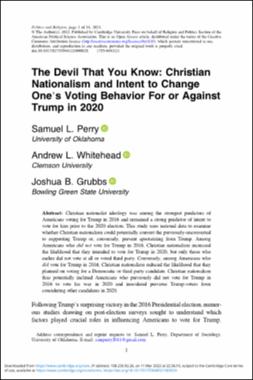| dc.contributor.author | Perry, Samuel L. | |
| dc.contributor.author | Whitehead, Andrew L. | |
| dc.contributor.author | Grubbs, Joshua B. | |
| dc.date.accessioned | 2022-03-11T22:39:23Z | |
| dc.date.available | 2022-03-11T22:39:23Z | |
| dc.date.issued | 2021-04-21 | |
| dc.identifier.citation | Politics and Religion, First View, pp. 1 - 18 DOI: https://doi.org/10.1017/S175504832100002X | en_US |
| dc.identifier.uri | https://hdl.handle.net/11244/334967 | |
| dc.description.abstract | Christian nationalist ideology was among the strongest predictors of Americans voting for Trump in 2016 and remained a strong predictor of intent to vote for him prior to the 2020 election. This study uses national data to examine whether Christian nationalism could potentially convert the previously-unconverted to supporting Trump or, conversely, prevent apostatizing from Trump. Among Americans who did not vote for Trump in 2016, Christian nationalism increased the likelihood that they intended to vote for Trump in 2020, but only those who earlier did not vote at all or voted third party. Conversely, among Americans who did vote for Trump in 2016, Christian nationalism reduced the likelihood that they planned on voting for a Democratic or third party candidate. Christian nationalism thus potentially inclined Americans who previously did not vote for Trump in 2016 to vote his way in 2020 and inoculated previous Trump-voters from considering other candidates in 2020. | en_US |
| dc.language | en | en_US |
| dc.rights | Attribution 4.0 International | * |
| dc.rights.uri | https://creativecommons.org/licenses/by/4.0/ | * |
| dc.title | The Devil That You Know: Christian Nationalism and Intent to Change One's Voting Behavior For or Against Trump in 2020 | en_US |
| dc.type | Article | en_US |
| dc.description.peerreview | Yes | en_US |
| dc.identifier.doi | https://doi.org/10.1017/S175504832100002X | en_US |

